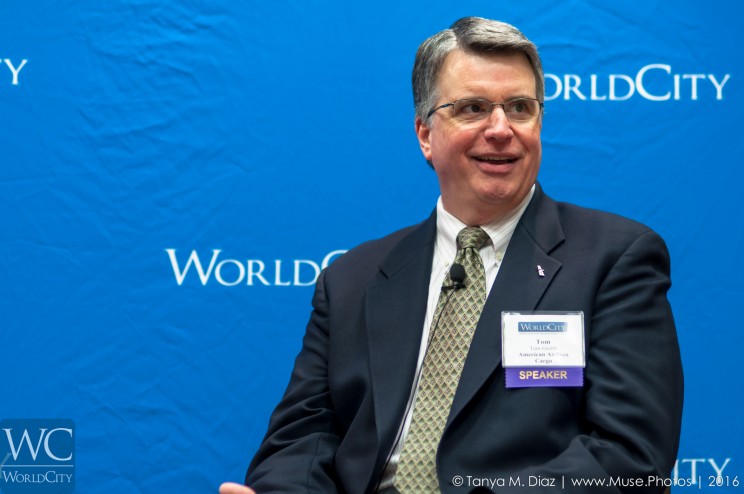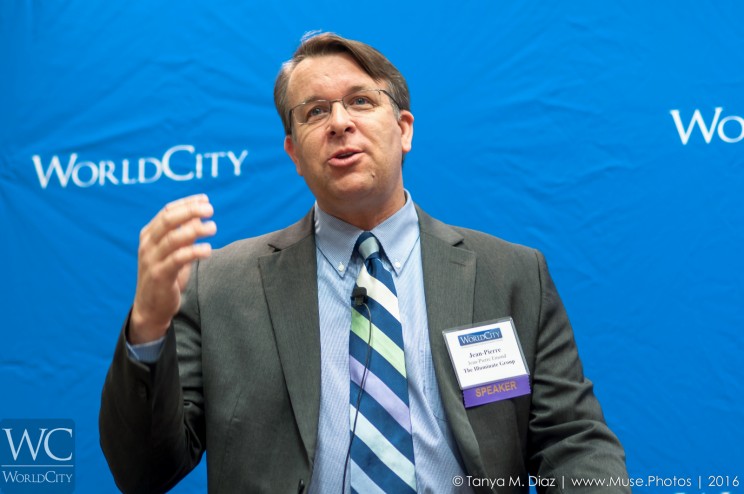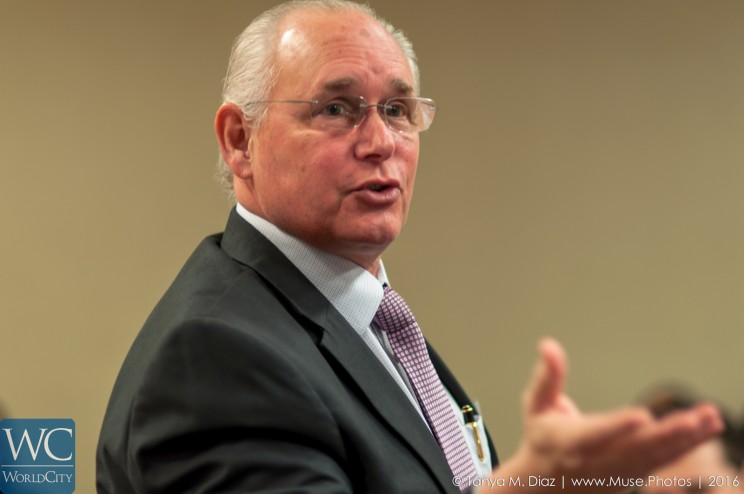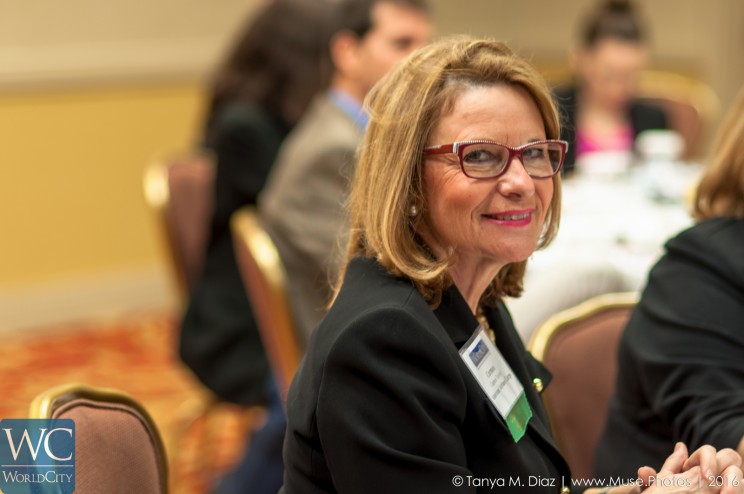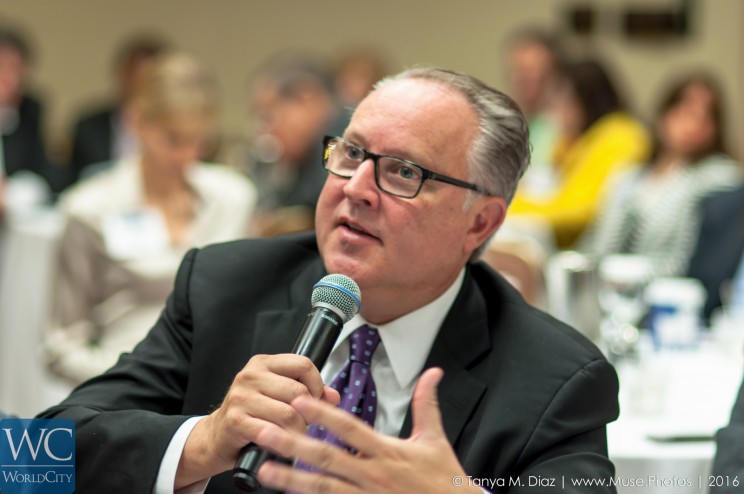With trade down, Miami looks to handle temperature-sensitive medicines
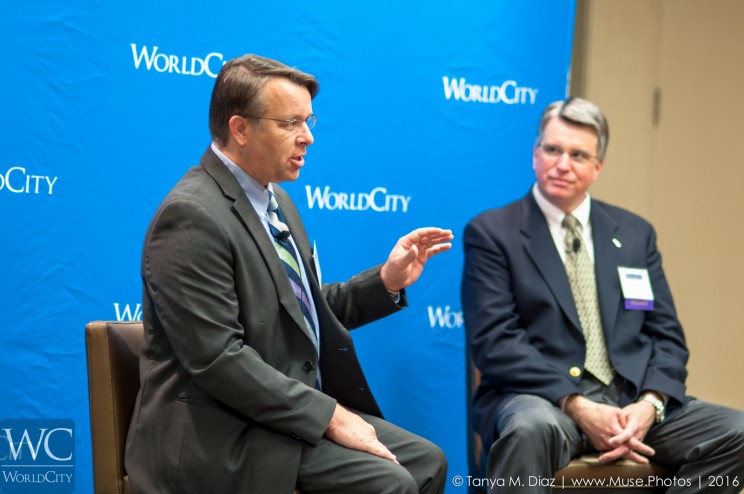 Falling prices for fuel and other basics cut the value of South Florida’s trade with the world in 2015 for the third year in a row.
Falling prices for fuel and other basics cut the value of South Florida’s trade with the world in 2015 for the third year in a row.
But the region has potential to boost business longer-term by increasing shipments of high-value medicines, building on new certifications obtained at Miami International Airport.
How to attract more temperature-sensitive freight to Miami dominated discussion at WorldCity’s Trade Connections event held Feb. 19, 2016 in Doral. More than 90 people attended.
Panelists pointed to opportunity in vaccines, blood and other high-value pharmaceuticals that require temperature control and often are shipped by air. Demand for those medicines is rising worldwide, while production of their components is being spread to factories around the globe.
Yet companies seeking the business need to prepare by training employees and investing in refrigerated facilities, said panelist Tom Grubb, manager of cold-chain strategy at American Airlines Cargo.
That’s because trade in cold-chain medicines is increasingly regulated – and with good reason. Small changes in temperature can compromise the strength of medicines. “They could become ineffective when they reach the patient, or worse, they could cause harm” without proper handling, said Grubb.
MIA, already the country’s No. 1 airport for international air freight, took a big step in 2015 to expand its medicines trade. It teamed up with the International Air Transport Association to become designated as a global pharma freight hub, the first in the United States. Some companies at MIA have earned certifications for cold-chain medicine handling, said WorldCity President Ken Roberts.
Miami has an advantage over many U.S. airports to handle medicines. MIA already shines as a hub for perishables, including flowers, fish, fruits and vegetables. Many logistics companies at MIA have refrigerated warehouses as well as know-how and experience in cold-chain handling, said panelist Jean Pierre Emond, a cold-chain consultant and chief operating officer of Illuminate Group.
What’s more, South Florida’s subtropical climate gives MIA an edge over places like New York.
“For the pharmaceutical industry, heat is not the biggest issue. Freezing is. If [a vaccine is] frozen for 30 seconds, it’s over,” said Emond. “And that’s something good for Miami, because it will never happen.”
MIA’s international trade in pharmaceuticals already jumped 79 percent between 2010 to 2014 to reach $3.3 billion that year, not counting the value of medicines sent as in-transit cargo, airport data shows.
Regulation rising for pharmaceuticals trade
Is rising regulation of medicines driven by industry or government?, asked audience member Mario Alfonso of ARCHON Business Services.
Both sides want rules, panelists said. Government aims to protect consumers, and industry also is concerned about potential liability.
“It’s much more important for the industry to be pro-active, rather than have the government impose something” that may not be technically feasible to comply with, said Emond.
New trade agreements, such as the Trans-Pacific Partnership, also seem to hold promise to harmonize rules among nations for pharmaceuticals trade, said audience member Lenny Feldman, managing partner in Miami for Sandler, Travis & Rosenberg law firm specialized in trade.
South Florida trade down again in 2015
South Florida could use a pick-up in trade, after the value of its imports and exports fell last year by 8 percent, or more than $9 billion, to $106.85 billion. That’s down from $124.59 billion in 2012, according to data from the U.S. Census Bureau analyzed by WorldCity.
Business dropped even more sharply with Brazil, South Florida’s top trade partner, as that South American nation faced recession, a weaker currency and other woes. South Florida-Brazil trade shrank by nearly 17 percent to $14.24 billion, down from a record $16.95 billion in 2014, the data shows.
Trade for the Miami Customs District dropped mainly because of lower prices for imported commodities including fuel and gold, said WorldCity President Ken Roberts. Still, the district – which spans airports and seaports from Key West to Fort Pierce – kept it ranking as No. 12 in the nation by trade value.
For the United States as a whole, trade also fell last year, partly from cheaper fuel imports. Indeed, the value of Canada’s oil shipments dropped so much that Canada lost its place as the No. 1 trade partner for the United States. China became the top U.S. trade partner for the first time, said Roberts.
The Houston area, known for its oil refineries, also saw the value of its fuel imports plunge. That led Houston to post the largest trade surplus among U.S. Customs districts, taking the title from Miami.
“That’s truly bizarre, because if you go back five to 10 years, Houston had a huge deficit,” as the value of its imports far exceeded exports, Roberts said. Miami for years had posted the country’s biggest trade surpluses because of its shipments of high-tech goods to Latin America and the Caribbean, he said.
Shipping medicines by sea?
Medicines trade stands to help more than Miami airport add business.
PortMiami is expanding into perishables, as more companies look to ship refrigerated goods by sea to cut costs compared to air freight, said audience member Eric Olafson, PortMiami’s manager for cargo development.
Miami-Dade County’s economic development group, The Beacon Council, also is encouraging drug makers to start factories and to offer clinical trials in the area, said audience member Stanley Rigaud, The Beacon Council’s manager for international economic development programs.
That still leaves the question of how transport companies might raise funds to train employees and invest in cold storage to add medicines business. At AmericanAirlines Cargo, Grubb said he used the “Field of Dreams” justification: “Build it and they will come,” although “the finance guys hate that one.”
Gary Goldfarb, chief strategy officer of Interport Logistics in Miami, said he’s confident the investments for medicines will happen. Some real-estate developers, said Goldfarb, “they are already building.”
Trade Connections is one of four event series organized by media company WorldCity to bring together multinational executives in the greater Miami area. The Trade series is sponsored by PortMiami, AmericanAirlines Cargo, HSBC bank and Miami-Dade County’s Aviation department.
The next Trade Connections event is set for April 29 from noon to 2 p.m. at the Coral Gables Country Club to kick off World Trade Month. The event will feature the directors of PortMiami, Miami International Airport and Fort Lauderdale’s Port Everglades. WorldCity also will release the latest edition of its annual Miami TradeNumbers report.
